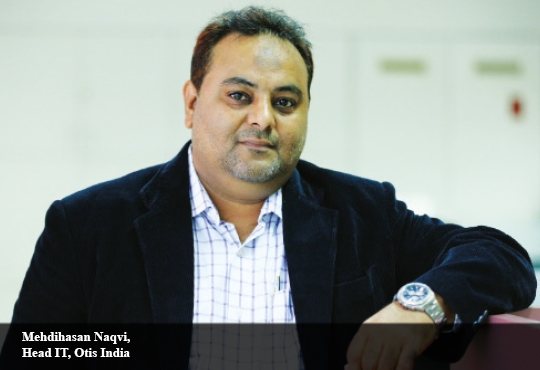
Urgency Of Securing The Cyberspace
Sanjeev Jain, CIO at Integreon | Wednesday, 18 September 2019, 09:14 IST
 With growing demands of IOT, Digitisation, Machine Learning and Robotic, process. Information security has become a very critical and imperative for all business functions. Every organisation has to go through rigorous process to ensure that they have all security controls that are implemented based on their business and client needs.
With growing demands of IOT, Digitisation, Machine Learning and Robotic, process. Information security has become a very critical and imperative for all business functions. Every organisation has to go through rigorous process to ensure that they have all security controls that are implemented based on their business and client needs.
Key pillars of Information Security
Three basic pillars of information security are confidentiality, integrity, and availability. Concepts relating to the people who use that information are authentication, authorization, and nonrepudiation. When information is read or copied by someone, which is not authorized to do so, the result is known as loss of confidentiality. For some types of information, confidentiality is a very important attribute. Examples include research data, medical and insurance records, new product specifications, and corporate investment strategies.
Three pillars of Information Security
In some countries, there may be a legal obligation to protect the privacy of individuals. This is particularly true for banks and loan companies; debt collectors; businesses that extend credit to their customers or issue credit cards; hospitals, doctors’ offices, and medical testing laboratories; individuals or agencies that offer services such as psychological counselling and agencies that collect taxes.
“As more people and businesses use online services, more entities become available for cyber criminals and hackers to target”
Information can be corrupted when it is available on an insecure network. When information is modified in unexpected ways, the result is known as loss of integrity. This means that unauthorized changes are made to information, whether by human error or intentional tampering. Integrity is particularly important for critical safety and financial data used for activities such as electronic funds transfers, air traffic control, and financial accounting.
Information can be erased or become inaccessible, resulting in loss of availability. This means that people who are authorized to get information cannot get what they need. Availability is often the most important attribute in service-oriented businesses that depend on information (for example, airline schedules and online inventory systems).
Information Security is significant for business
The Importance of Information Security lies in protecting information, which is critical for business. As a business, it is important to maintain the physical property we own and protect it against intruders, potential theft and other acts that could cause issues within premises.
The ISO certification provides enhanced data security and integrity both internally and to all of clients. It also plays an important role in sending a valuable and important message to customers and business partners alike, both present and future, that company does things the right way. Additionally, the numerous benefits provide a competitive advantage, especially in the Outsourcing industry where trusting partner is the most crucial part of a client/provider relationship.
As we are moving more towards digital, we are sharing information in more different websites than ever before. Every day millions of us power up our devices and connect to the internet to access online services so that we can get the latest news, shop for the best deals, chat and connect with friends, stream music and videos, share our view on social websites and access our financial information.
As more people and businesses use online services, more entities become available for cyber criminals and hackers to target. Therefore, we are increasingly more exposed to social engineering and targeted spear phishing attacks, and vulnerable to financial fraud and identity theft.
It has become necessary to ensure that we protect information and ourselves we share online. Refer below someone of the best practices we must follow while digitally online with various platforms.
Security best practices
• Clear commitment to data security- including confidentiality and strict accessibility rules
• Document procedures related to manage risk ;
• Process for storing and handling confidential client information and controls implemented
• Data transfer during transit needs to have all necessary controls and information is encrypted
• Building strong awareness training program among all Employees
• Protects the company, assets, shareholders, employees and clients;
• Protect personal information by following guidelines for managing passwords, learning how to avoid phishing scams, and by implementing all secure computing practices at all times.
• Third party Vulnerability assessment and penetration test on critical IT Infrastructures is one of the strong exercises and each company must ensure that it is conducted at least once in a year.
• Keep computer desktops, laptops, and smart phones protected with the latest Operating System and application security patches, up-to-date with anti-malware programs.
• Implement best practices in terms of hardening of network devices and servers.
• Do not modify Smartphone’s security settings
• Only install apps from trusted sources
• Understand app permission before accepting them - be careful about granting apps access to personal information
• Be careful on open Wi-Fi Networks - Your phone can be an easy target to cyber criminals on a public Wi-Fi network
• Regular backup data, one of the most basic, yet often overlooked. It is highly recommended that one must create a backup on different device.
• Encrypt hard drive using in built device software
• Properly dispose of electronics, it is true that nothing is ever really deleted permanently from computing device; hackers and technologically savvy criminals are often able to recover information from hard drives if they have not been properly disposed of.
Summary
As the world is getting increasingly interconnected, everyone must share the responsibility of securing cyberspace.
CIO Viewpoint
By Sumi Ghosh, CEO at Tata Starbucks Pvt. Ltd
Organizations Need To Mandate Investments To...
By Mehdihasan Naqvi, Head IT, Otis India
Urgency Of Securing The Cyberspace
By Sanjeev Jain, CIO at Integreon
CXO Insights
Cloud Computing Trends And Strategies For 2019
By Manu Sharma, Director Information Technology & Corporate Security, OnMobile GLobal Limited
Top Cloud Computing Growth Drivers
By Vishal Vasu, Director & CTO, Dev Information Technology Ltd
Financial Services - Adopt Cloud For Speed And...


.jpg)




